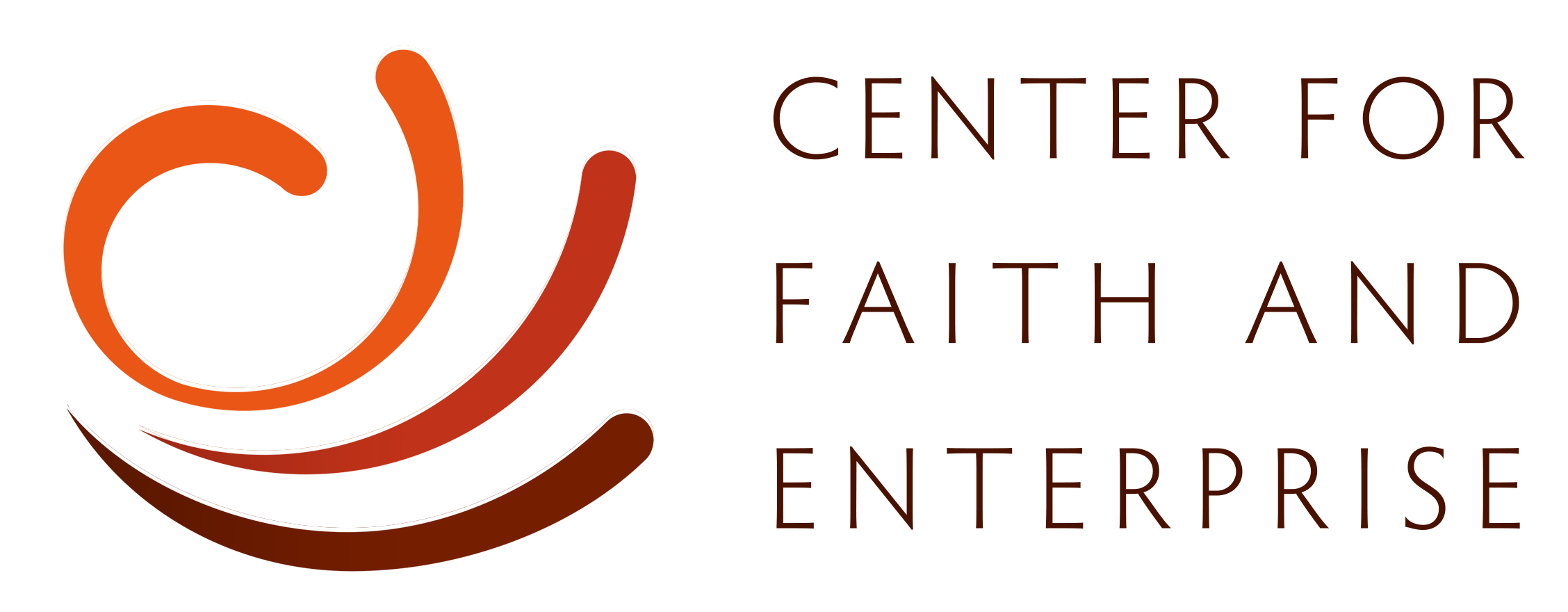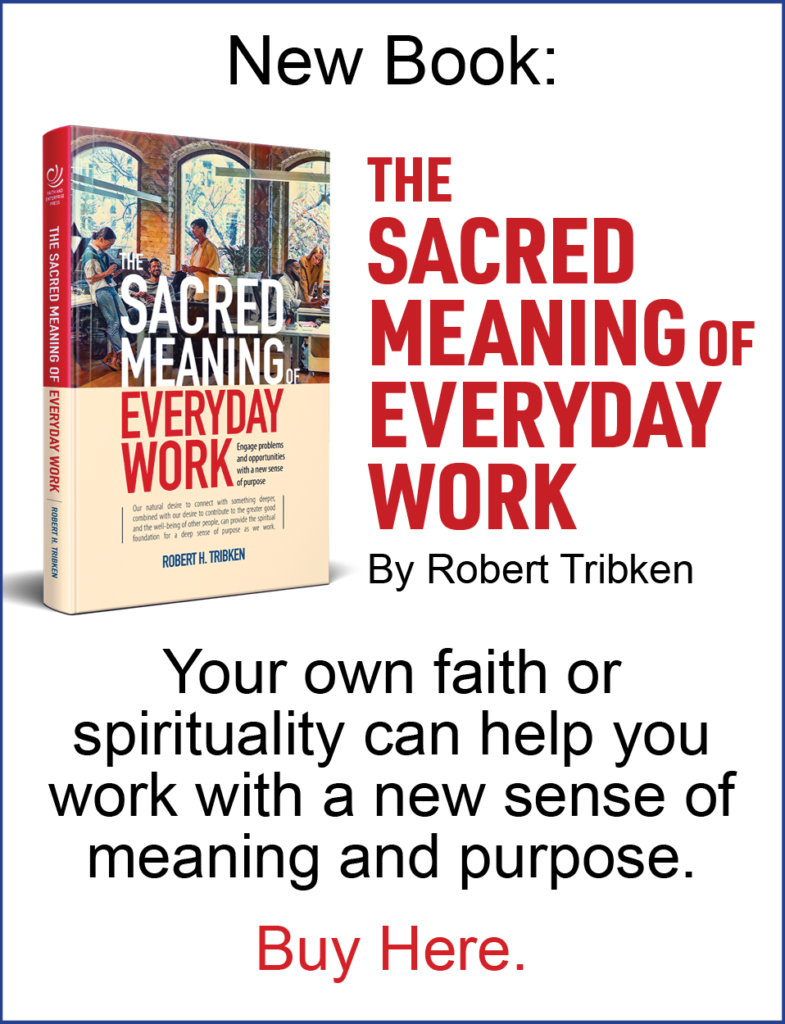Entering the State of Flow: Is There a Spiritual Connection?

By Rob Tribken
Chairman
Center for Faith and Enterprise
Most of us are familiar with the expression “being in the zone”, and in fact most have probably experienced it themselves at some point. It is usually thought of as involving a higher level of alertness, concentration, and maybe skill. Most people also remember it as a very positive experience, perhaps even joyful.
One of the interesting things about being in the zone is that for most people it is most likely to happen during a leisure activity of some sort — perhaps an athletic event or other type of game, watching a fully absorbing movie, or reading a great book. It is not usually associated with our work life. This raises the question — what if we were able to experience being in the zone more often in our work?
The State of Flow
When psychologists speak of being in the zone, they usually refer to it as being in a “state of flow.” This is a concept and term developed by psychologist Mihaly Csikszentmihalyi. He described flow like this:
“. . . a state of concentration so focused that it amounts to absolute absorption in an activity. Everyone experiences flow from time to time and will recognize its characteristics: people typically feel strong, alert, in effortless control, unselfconscious, and at the peak of their abilities. Both a sense of time and emotional problems seem to disappear, and there is an exhilarating feeling of transcendence.”[i]
Characteristics of Flow
When we are in a state of flow, we are fully engaged with the task, working at peak effectiveness, and not coincidentally experiencing something of a feeling of joy. Such experiences typically involve most, and sometimes all, of the following characteristics:[ii]
- The individual believes that the task is worth doing (i.e. it has meaning and significance).
- There is a good fit between the challenges of the task and the skills of the individual. There needs to be enough challenge to require the full attention of the participant without the person becoming bored and disengaged, but not so much that the person becomes frustrated or overwhelmed.
- Full attention is given to the task, resulting in a temporary merging of action and awareness; no attention is available for distractions such as anxieties about job performance or security.
- The task has clear goals and natural progress points. While the person should not be concerned with whether or not they will be successful, it can be helpful if there is a sense of progression in fulfillment of the task.
- The sense of time can be altered in a paradoxical manner. While performing the task (or looking back on the experience), there can be a sense that time has slowed down. On the other hand, when the task is finished the person can be surprised at how much time has actually elapsed.
- The person experiences a sense of joy as self consciousness recedes and he or she becomes fully absorbed in the task.
Ordered Consciousness
Csikszentmihalyi also speaks in terms of disordered versus ordered consciousness; ordered consciousness can be associated with the state of flow. He describes ordered consciousness as follows:
“They are situations in which attention can be freely invested to achieve a person’s goals, because there is no disorder to straighten out, no threat for the self to defend itself against.”[iii]
A disordered consciousness is one in which the mind is pulled involuntarily in unwanted directions, often by fears, anxieties, resentments, and other forms of painful dysphoria. An ordered consciousness on the other hand involves developing the capability to focus attention on the selected task or interest while letting go of the various dysfunctional distractions.
Csikszentmihalyi believes that ordered consciousness is more likely to result in human happiness. We are more likely to be able to give our full attention to an activity and then to disengage fully when the time comes to stop. In other words, when it is time to stop work we can do so and move fully on the other activities, including family activities, without continuing to be preoccupied with our work.
Imagine, then, if we could spend much more of our work time in a state of flow. We would be more fully engaged, focused, free of distractions, and effective, and would probably experience a deeper sense of satisfaction and maybe even joy in our work. We would also be completing our work in less time, giving us extra time for other activities.
At least as I understand it, the concept of flow revolves around the matter of absorption in the activity or interest. Being interested in the activity, encountering an appropriate level of challenge, and being able to avoid interruptions can all be important. But I think the biggest issue for most of us is probably the ability to concentrate fully on the task itself, without mental distractions. We cannot be concerned with what others think about what we are doing, with the prospects for success, with the outcome’s effect on our social status, or with our ego needs. We need to be fully absorbed in the task itself. This suggests an important role for our faith and spirituality.
Is There a Spiritual or Religious Connection?
As a practical matter I think there are several possible points of contact between our faith and spirituality on the one hand, and the state of flow on the other:
- Spiritual practices can help us move in the direction of the state of flow. Being able to focus on the task at hand, letting go of distractions, and working in a more relaxed state (or at least less tense) are all possible benefits from spiritual practices. To develop a deeper sense of mission through our prayer and meditation, and then to execute this mission as we move outward into the world, has to enhance our abilities in this regard.
- Our faith and religious involvement help us develop virtues such as patience, humility, compassion, equanimity, courage, transparency. To the extent that we are able to develop these, we become less likely to be burdened by the distractions of resentment, anger, fear, pride, and excessive self concern. These can be major distractions keeping us from becoming fully engaged; letting go of them can be a big step forward.
- Knowing and accepting who we are in a deeper sense, and especially in relation to God and the greater reality, also helps us to let go of these distractions.
I also wonder if the state of flow itself might be inherently spiritual, at least for some people. It represents a state of being fully engaged and fully conscious, without interference from our surface ego.&n>bsp;And it is an engagement that is neither obsessive nor enslaving; Csikszentmihalyi observes that people who are able to enter a state of flow are also better able to leave their work behind when it is time to stop. In the first quote above, Csikszentmihalyi noted that the experience of flow can include “an exhilarating feeling of transcendence.” Is this inherently spiritual? Readers can judge for themselves.
Reference:
[i] Csikszentmihalyi, Mihaly. http://www.psy-flow.com/sites/psy-flow/files/docs/flow.pdf . Global LearningCommunities (2000).
[ii] Csikszentmihalyi (2008/1990). Pp. 48ff.
[iii] Csikszentmihalyi, Mihaly (2008/1990). P. 40.

